In the realm of advanced climate control, centralized air conditioning systems stand out as the epitome of efficiency, scalability, and comfort. These systems are designed to regulate the temperature of an entire building from a central point, providing uniform cooling or heating to each room or zone. In this blog post, we'll explore the myriad benefits of centralized AC solutions and why they are the cornerstone of modern HVAC strategies for both residential and commercial applications.
Understanding Centralized AC Systems:
Centralized air conditioning systems consist of a central unit or plant that generates cool or warm air, along with a network of ducts or pipes that distribute this conditioned air to various areas within a building. The central unit is often located in a dedicated mechanical room, away from occupied spaces, minimizing noise and optimizing efficiency. These systems can be designed to operate in either a ducted or ductless configuration, depending on the specific needs of the building.
Key Features of Centralized AC Solutions:
Whole-Building Temperature Control: Centralized AC systems provide comprehensive control over the indoor climate of an entire building. From individual rooms to large open spaces, these systems ensure consistent and customizable temperature levels throughout.
Energy Efficiency: Centralized systems are engineered for energy efficiency, often incorporating advanced technologies such as variable speed compressors, programmable thermostats, and smart controls. This results in optimized energy consumption and reduced utility costs over time.
Zoning Capabilities: Zoning is a key feature of centralized AC solutions, allowing users to divide a building into different zones with independent temperature control. This flexibility is particularly valuable in structures with varying thermal loads or distinct occupancy patterns.
Quiet Operation: The centralization of mechanical components in a designated area minimizes noise levels in occupied spaces. By isolating noisy elements from living or working areas, centralized AC systems provide a quiet and comfortable environment.
Scalability: Whether you're dealing with a small residential unit or a large commercial building, centralized AC solutions are scalable to meet the specific needs of the project. This scalability makes them suitable for a wide range of applications.
Benefits of Choosing Centralized AC Systems:
Uniform Comfort: Centralized AC systems deliver uniform comfort by ensuring that every corner of the building receives the desired level of cooling or heating. This eliminates the need for individual units in each room, contributing to a more streamlined and efficient system.
Space Optimization: The centralization of mechanical components allows for efficient use of space within a building. This is particularly advantageous in structures where floor space is limited or where aesthetic considerations are crucial.
Ease of Maintenance: Centralized AC systems are often easier to maintain due to the centralization of key components. Routine maintenance tasks, such as filter changes or system inspections, can be performed in a centralized mechanical room, minimizing disruptions to occupied spaces.
Long-Term Cost Savings: While the initial installation cost of centralized systems may be higher, the long-term cost savings in terms of energy efficiency and maintenance can outweigh the upfront investment. These systems are designed for durability and longevity.
Conclusion:
Centralized air conditioning solutions represent the pinnacle of HVAC technology, offering a comprehensive approach to indoor climate control. From energy efficiency to scalability and uniform comfort, these systems redefine the standards for residential and commercial spaces alike. Step into a world where comfort is not just a luxury but a mastery of technology – welcome to the realm of centralized AC solutions, where every room enjoys the perfect climate.





No comment